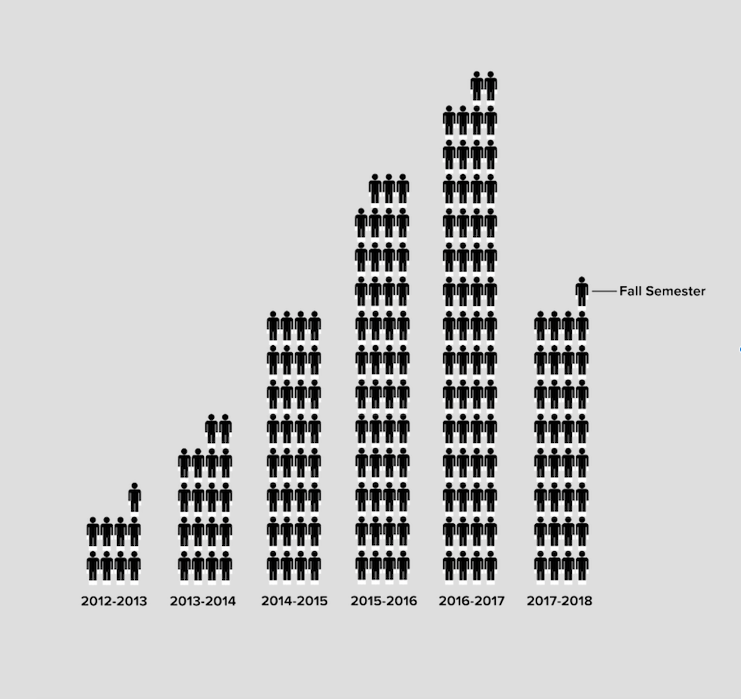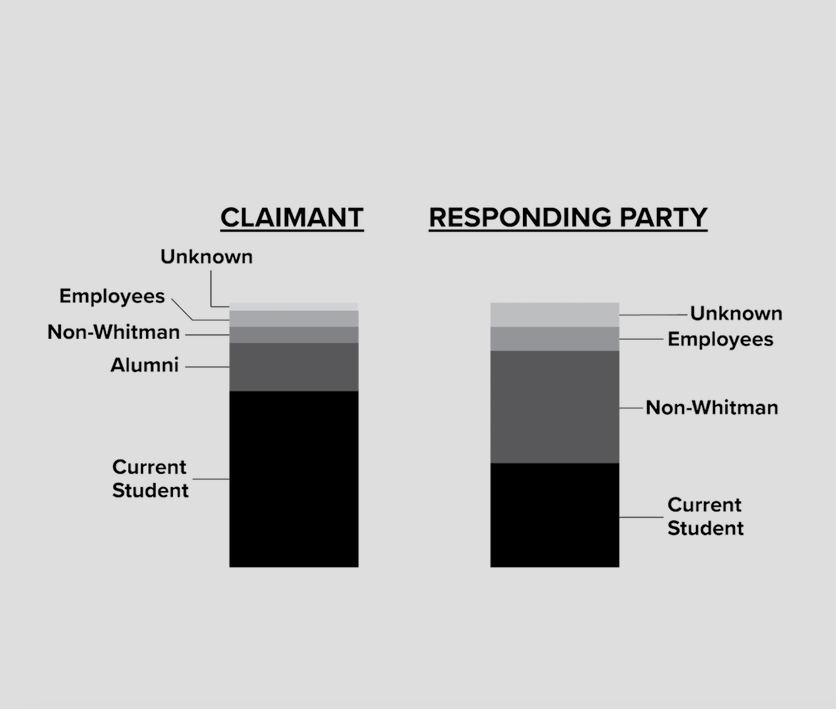Fall 2017 Sex- and Gender-Based Discrimination, Assault & Harassment Data Released
February 6, 2018
The content of this article discusses harassment and sexual violence and may be emotionally intense for survivors. Resources and support are available through the Welty Counseling Center and Sexual Assault Victim’s Advocate Hailey Powers.
Information on sexual assault and domestic violence statistics reported during the 2017 Fall semester have been updated. The Associate Dean of Students and Title IX Administrator Juli Dunn continually compiles a master list of the data in a document colloquially referred to as the “dashboard.” The number of incidents being reported has skyrocketed in recent years, and the Fall semester was no exception–33 reports in total were reported to Dunn’s office.
Of the 33 reports, filed from July 1 to January 29 of 2017, the largest incident category was non-consensual penetration (28.1 percent), followed by unwelcome touching or groping (21.9 percent), intimate partner violence (9.4 percent) and unwelcome statements or actions (9.4 percent). Other categories included stalking, exploitation, unknown, harassment and retaliation for reporting an earlier incident.

Eighty-one percent of the claimants identified as female, while 96 percent of responding parties identified as male. The data also saw an increase in electronic forms of harassment, exploitation and intimate partner violence.
Twenty-five of the reports occurred this academic year, and eight of them from previous years–-including one incident from the 2012-2013 school year and one from 1980-81. This year, six of the 33 claimants were Whitman alumni, an unusually high rate.
Dunn said that all six alumni reports came after the story that detailed allegations against Harvey Weinstein broke on Oct. 5. Alumni weekend fell only a few days after that date, through the weekend of Oct. 12.
“I think that’s really important that people who experience [some form of sexual misconduct] here on campus and have since graduated and gone on to do whatever, that they feel it’s important for the college to know that that happened to them,” said Dunn. Some of the alumni reports were third-party, meaning someone else–often a close friend–reported the incident.
Dunn said that there is also almost always a spike in reports in the days following the Take Back the Night event in April and the FACE-sponsored Breaking Ground Monologues that take place in late February or early March.
Perhaps the largest anomaly in the data compared to recent years was the high number of non-Whitman responding parties. Of the 33 total responding parties this Fall, 42.4 percent were identified as non-Whitman, more than double that of last academic year (17.2 percent). A potential explanation for the unusual data is this Fall’s rise in alumni reports–there is no separate category for responding parties who are not current students.
Last year over Fall and Spring semesters 58 incidents were reported to Dunn, but more than three fourths of the responding parties were students. The outlier of non-Whitman responding parties makes this year’s statistics difficult to compare with years past. The data is particularly skewed in the section that tracks the outcome of each case. With non-Whitman responding parties, the college has much less control. This fall, the largest outcome category was “resources and support only” at 47.4 percent of a total of 19.
Of the 13 current known student responding parties, nine out of 13 were not Greek-affiliated, compared to two parties who were Greek-affiliated, and two whose affiliation is unknown. The split between Greek and independent claimants was more evenly split: 40.9 percent were in Greek groups, while 36.4 percent were not (22.7 percent unknown).
Led by senior Kendall Dunovant, the Greek Advocates Program (GAP) is a council comprised of designated representatives of Greek groups. Members can use their student representatives as a resource for information and support relating to discrimination, harassment and violence.
Junior Brahm Coler is the head of the Referral, Education and Prevention (REP) student group. REP (previously called Whitman Advocacy Group) began last January as an initiative started by sophomore ASWC senators who saw a gap in support networks for independent students.
REP currently has over 20 members that went through intensive 12-hour trainings to be able to advocate for other students. None of the members are required reporters. While the REP has resources available currently, the members are not very well known. Over the coming months, Coler intends for REP to become a more familiar presence on campus that people can depend on, but he is cautious about moving forward too quickly.
“I really do not want to rush into something and have it very quickly stigmatized, or shut down, or thought of as problematic. Because then we’ve actually just done something reductive,” he said.

Another trend in the Fall data’s student responding parties was a disproportionately high number of athletes. Of the 13 responding parties, 38.5 percent were athletes, equal to those who were not. The involvement of the remaining 23.1 percent in athletics was unknown. According to Whitman’s website, athletes make up approximately 17 percent of the student body. The trend of high claim reporting rates against student athletes has not gone unnoticed the past few academic years.
“You put a bunch of hyper-masculine males together and you can really create a bigger rape culture … that’s how I would think of and explain the disproportion of athletes being a responding party,” Domestic Violence Sexual Assault Victim’s Advocate Hailey Powers said. Powers works with students but is unaffiliated with the school to avoid conflicts of interest and is instead employed by the YWCA.
Powers also noted that the potential of repeat offenders should be considered. “We know [based on probability] that it’s likely there is a fewer number of people who are committing the majority of assaults,” said Powers.
In response to the disproportionate statistics, the group Athletes for Consent Education was formed during the 2016-17 year. ACE has held workshops for athletes in the past and collaborates with Associate Dean of Students Barbara Maxwell as well as other student prevention and support groups including GAP, REP and the SVP interns.
Senior Molly Unsworth is involved with Party Safe, a broader initiative with the goal of creating a safe party culture on campus.
“The past few years that I’ve been here I think reporting has become more widely accepted and knowing the resources available to you and knowing you aren’t pressured to do anything when you report has become more widely known,” she said.
Unsworth also identified the creation of Hailey Powers’ position as a positive step. Powers has only been working with Whitman since September of 2016, so it is too early to definitively tell how her position has influenced the dashboard. Certainly, though, she has seen an increase of the number of students who approach her for advocacy and support.
“Last year I saw 12 or 13 students, and this year we are already at that number through one semester. I think more students are reaching out to me as a confidential resource to talk to about things they have questions about, things they aren’t sure about, and then deciding what they want to do from there, and they want to talk through it with someone who won’t tell anyone else,” she said.
In the fall, Powers also launched a support group for survivors of sexual assault. She hopes to continue the meetings this semester.
Powers noted that although the dashboard data is important when considering larger trends of sexual assault and harassment on campus, it can be reductive. “Each one of these 33 people have a story and have an experience that can’t be captured in a report like this,” she said.
While taking precautions to protect the confidentiality that is important for the safety and well-being of survivors, the weight of each experience can sometimes be lost in the numbers. Unsworth noticed that the #metoo movement gained traction because survivors began to identify themselves publicly.
“With Harvey Weinstein, it had been an undercover joke in Hollywood and certain circles for years and years and years, and it took someone coming forward and… putting their face on something for people to think it’s real. The same thing can happen often at our school,” said Unsworth. “It’s such a hard line. And it’s such a heavy burden that is placed on survivors–like it’s their responsibility to identify themselves. And it’s absolutely not.”
A full dashboard report and future updates are available upon request through Juli Dunn.





